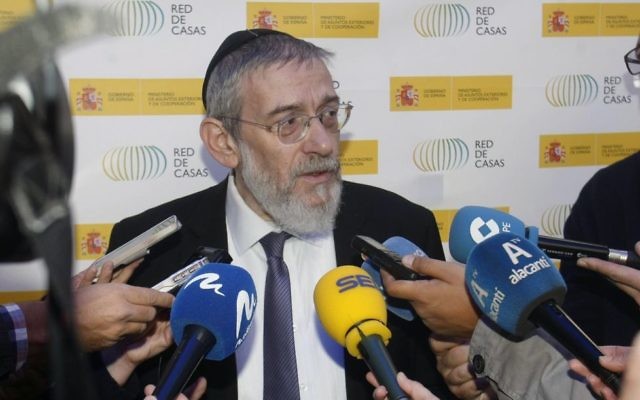Rabbis, Hamas leaders’ peace summit
An unusual peace summit of Israelis and Palestinians has ended with a strong message: religion can be part of the solution, not just a cause of conflict.

AN unusual peace summit of Israelis and Palestinians has ended with a strong message: religion can be part of the solution, not just a cause of conflict.
The summit saw Israeli rabbis sit down with a founder of Hamas’s military wing and other Palestinian sheikhs, and issue a joint commitment “to relentlessly seek peace”.
The development took place many miles from the pressure cooker of Jerusalem – at a peace summit for religious leaders held in Spain. For years, under-the-radar discussions took place between many of the 25 Israeli and Palestinian participants, and finally the participants were meeting in the open and making their voices publicly heard.
And this time, it wasn’t just the usual suspects. It was not a gathering just of the normal dovish dialoguers, but mainstream figures from Israel like the Ashkenazi Chief Rabbi David Lau, and Palestinians like the Islamist leader who was quoted saying that ISIS has reasonable demands but its methods are the problem, and a founder of Hamas’s military wing.
Hamad Abu Daa’bas, the head of the Southern Branch of Israel’s Islamic Movement, who was quoted two years ago saying that ISIS causes concern because of its methods, but it “raises reasonable demands”, and that “the killing methods of Israel and the US are not better than the crimes of the Islamic State.”
Rabbi Benjamin Lehman from the faculty of the Har Etzion Yeshivah in the West Bank, was among the rabbis who took part in discussions with Palestinian leaders including Imad Falouji, a founder of Hamas’s military wing, and Fakher Abu Awad, who used to sit on Hamas’s governing council.
In their declaration the 20 rabbis and sheikhs, joined by a handful of Christian leaders, agreed: “We vehemently call for the cessation of incitement, misrepresentation and distortion of the image of the other and of the neighbour. We commit ourselves to educate future generations to uphold mutual respect.
“Drawing upon the religious traditions, and our understanding of what is best for our communities and peoples, we call for a solution that recognises the right of the two peoples to exist with dignity.”
They decided: “All three religions value the principle of the sanctity of life, and we call for its practice in daily life in our Land. The violence that is conducted, supposedly in the name of God, is a desecration of His name, a crime against those who are created in His image, and a debasement of faith. The proper means of solving conflict and disagreement is by negotiation and deliberation only.”
Before they parted to return to Israel, the West Bank and Gaza, they decided to establish a standing committee to gain traction for these ideas in their communities.
Shortly after this decision was taken, the organiser of the summit, Rabbi Michael Melchior – an Orthodox rabbi who founded the Mosaica Religious Peace Initiative – told The AJN: “Every leader who was there has hundreds of young students who are ready to put [the declaration] into action.”
Mosaica ran the summit along with the Palestinian-run Adam Centre for Dialogue of Civilisations. It was hosted by the Spanish government, and sponsored by the United Nations Alliance of Civilisations.
Rabbi Melchior called the event a “miracle”, noting that many of those involved never believed that they would ever take part in such a meeting.
NATHAN JEFFAY

comments